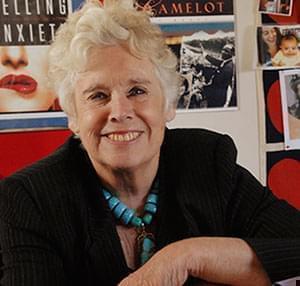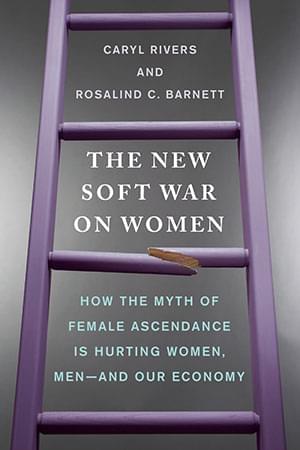‘New Soft War On Women’ Is Pushing Progress Back
Conventional wisdom says there’s never been a better time to be a woman. For the first time in U.S. History, women make up half of the educated labor force and are earning the majority of advanced degrees.

Caryl Rivers is an author, journalist and professor at Boston University.
Not so fast. Caryl Rivers says if you look more closely, women now must fight what she dubs the “New Soft War on Women.”
“While women were making great progress in the nineties, that has halted and we’re seeing a stalling out or moving backward,” said Rivers. “Fewer women on boards, fewer women among high earners, fewer women moving up the ladder particularly as you get beyond the entry levels.
She says that when women are working with a male on a project, “even if they are the senior person, and the male is very junior, it’s astonishing how people assume that the male was the lead person.”
“It’s very real, it’s in people’s heads, and interestingly enough, women as well as men sometimes have these attitudes,” says Rivers. “Many women are surprised to say, ‘Oh my gosh, I have those thoughts, even though I’m a woman, even though I’m a feminist, I fall into that trap.”
“Men get promoted on potential and women on performance.”Caryl Rivers
“Almost when the man walks in the door it’s assumed, he’s going to work hard, he’s ambitious, he’s going to be an asset to the company, whereas the woman walks in the door and she has to prove it.”
The book, New Soft War on Women: How The Myth of Female Ascendance Is Hurting Women, Men - And Our Economy, has recently been released in paperback. In it, Rivers and her co-author Rosalind Barnett include many stories including one from a women who was reduced to uncontrollable shaking from the stress of trying to outperform her male colleagues in order to be considered equal. When she arrived at the ER she was told by the doctor “Oh, you’re from [x firm] - we get one or two of you women every a week.”
Similarly, she says, women are given less leeway to fail. If you are a woman, Rivers says, “you’ve got one shot, and maybe because people have this idea in their heads ‘well, women can’t do it anyhow’ so when they fail, that confirms the stereotype whereas a man – ‘well, he’s going to fail every now and then but basically he can do it. He’s got the right stuff,’ and that, I think, accounts for the 'no second chances' syndrome which is pretty extensive.”

Mentors vs. Sponsors
Rivers reports that her research shows that men tend more to get sponsors, while women tend to find mentors.
“The difference is that sponsors are somebody who will go out on a limb for you. The sponsor will go to your supervisor or to somebody influential and say ‘Hey, you’ve got to take a look at Mary F here, she’s fabulous,” says Rivers.
In contrast, mentors offer support and advice, “but the mentor doesn’t take the next step of putting [his or her] butt on the line for you if you are female.”
Well, You May Be Successful But You Aren’t Likable
“When men are competent or forceful they are automatically assumed to be likable. When women are competent or forceful they are assumed to be the b-word,” said Rivers.
One of the studies Rivers sites took place in a business school. Identical resumes for Howard and Heidi were circulated. While both were rated equally competent, “they said that Howard was a good boss and likable, and they said that Heidi was self-centered and selfish.”
This Situation Actually Isn’t So Great For Men…
Rivers and her co-author, Rosalind Barnett, found several reasons that, though the issues faceing women may appear to paint a pretty picture for men, it's actually hurting them too.
We have to make sure when we talk about these issues that the men are in the room.Caryl Rivers
First, many families today are kept in the middle class by the second salary working women are bringing in. When women are skipped over for promotions, that puts a dent in the family income as a whole. "A man who is married or has a partner, his economic future depends very strongly on his partner or spouce."
Further, she says that we’re experiencing a female brain drain and that “we know when companies do well it’s often because they have a substantial number of women up in the higher echelon,” said Rivers. When women are repeatedly passed over for promotions or recognition, they not only aren't able to contribute their full potential, but often become discouraged and may begin looking elsewhere for employment that values their skills.
What Can Be Done To Fix This?
When she meets young women one of the first things she says is “Be aware. Understand that these things exist.”
While women were making great progress in the nineties that has halted and we’re seeing a stalling out or moving backward.Caryl Rivers
She says women need to look actively for sponsors who will point out their accomplishments; meanwhile, companies need to be more aware about assumptions that may be holding their female employees back - for both the women and the company's sake.
Rivers says another thing we need to do is hold workshops in companies “to start examining things and saying look, here’s … why you’re thinking [this]” and companies need to make sure that men attend. She says that most of the talks she and her co-author give are attended almost exclusively by women.
She says that the more we talk about the subconscious assumptions many people hold, and the more awareness we raise about why people are thinking that way, the more we can combat these issues. "There are ways to change it, but you can't change it if you don't talk about it or know about it."
Lastly, while conversation and workshops are helpful, there is also a role for goverment and company policy to play.
"The battles aren't won. They're tougher now because they are harder to see."
How This Plays Out In Politics
Rivers says there a number of related reasons that men dominate the political fields.
To start, women tend to run much less often and tend to be older when they first run for office, so it’s harder for them to climb the ranks. That is added to the tendency for them to start smaller – while a man might start with congress, a woman will often start with the school board or the board of aldermen.
“When men are competent or forceful they are automatically assumed to be likable. When women are competent or forceful they are assumed to be the b-word.Caryl Rivers
“And then when women do run, and younger women see how they are treated that also turns women off. I mean, ‘Do I want to get into this race and have my cleavage, and my thighs, and my face – the recent Donald Trump comment about Carly Fiorina’s face – has any male candidate’s face been mentioned in any kind of debates? Of course not,” said Rivers.
Hilary Clinton, too, she says is experiencing the same issues. “If she’s emotional she’s ‘ugh, she’s a woman. She can’t be tough enough. No one seems to care that John Boehner seems to weep every second day,” says Rivers. “And then the likability factor is coming up – they’re saying ‘well, she’s not authentic, she’s not real … I think, in the email scandal, it looks like when all the investigations are through that Secretary Clinton did nothing wrong, … and she’s being punished harder for that than a man might be who had done the same thing.”
“We have, I think, a really long way to go and I think the key thing is we need to get a woman in the office so there will be a role model, so we can see a woman who’s there and we can say ‘ah, guess what? The world didn’t fall apart.’”
Continuing The Conversation
For more stories from women who blazed new trails, tune into American Masters: The Women’s List on Friday, September 24th at 8:00 p.m. on WILL-TV.
On Monday, September 28th, the Women’s Resources Center and the YWCA will be hosting “Women In Leadership: Challenges and Opportunities” as part of their Hot Topics Dialogues series. They say the panel will “explore diverse conception of what it means to be a leader, as well as the influence of gender and other social identities of leadership itself within the landscape of the popular bestseller Lean In and narrow definitions of leadership.”
Lastly, Makers was launched by AOL in 2012 and produced several documentaries with PBS. They seek to celebrate women’s achievements, highlight issues women face.

